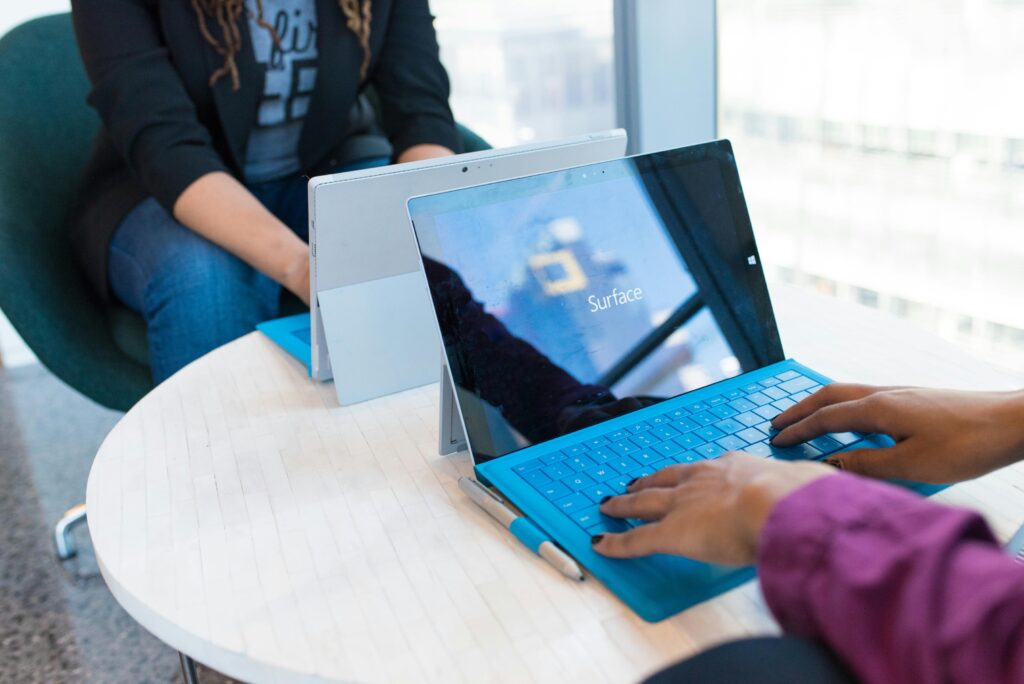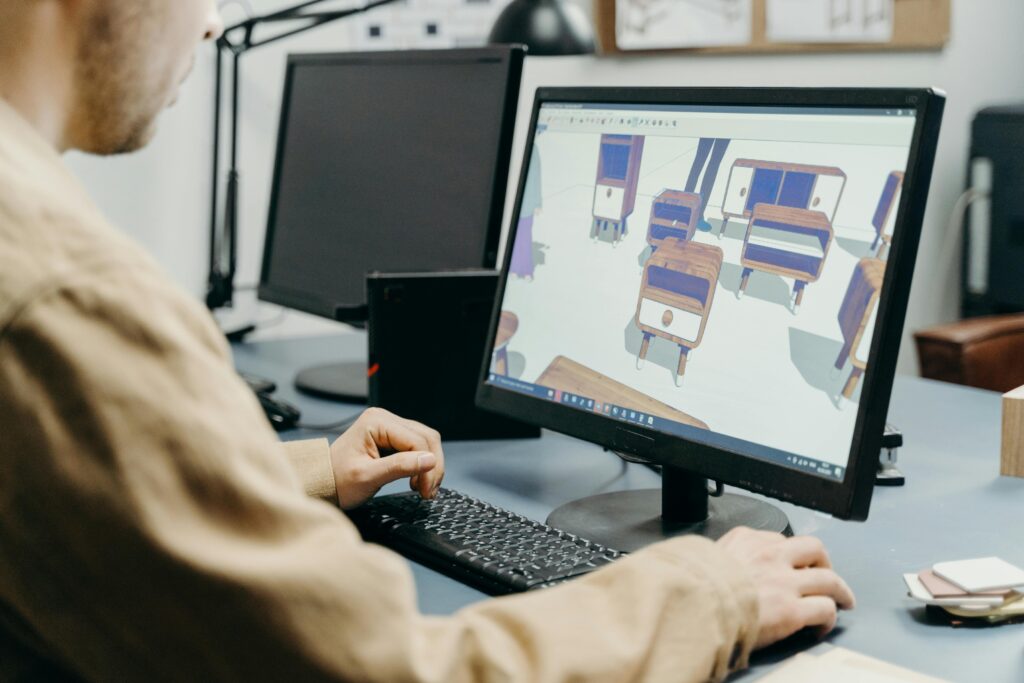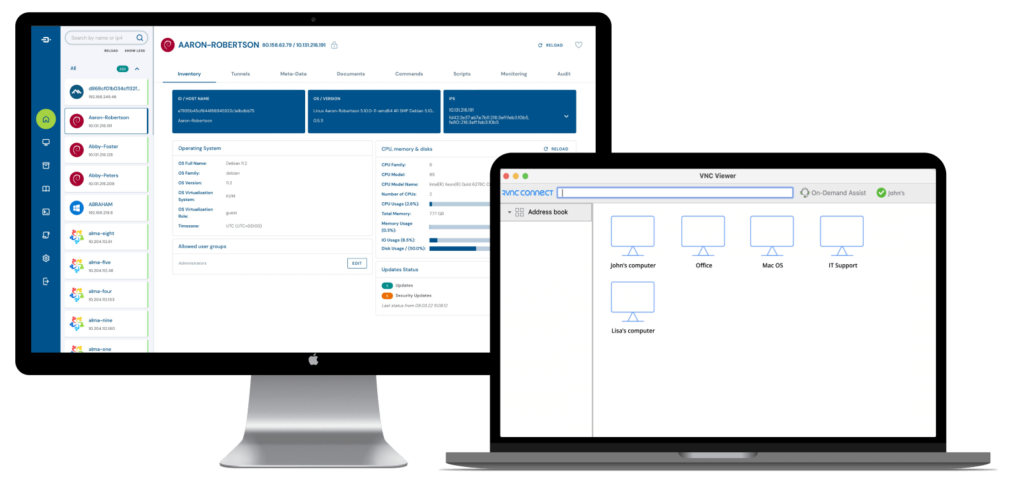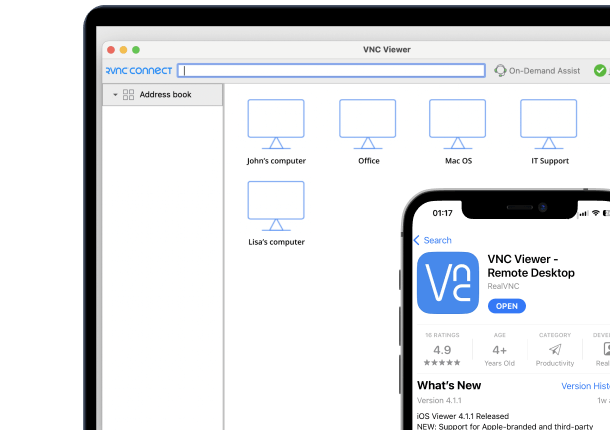When it comes to remote desktop solutions, the question of VNC vs RDP often arises. These two popular tools are at the forefront of remote access technology, but deciding which one is best for your needs can be challenging.
From accessing critical files to supporting colleagues in real time, remote desktop tools are indispensable for modern businesses. However, understanding the key differences between VNC and RDP is essential to selecting the right solution.
In this guide, we’ll explore VNC and RDP, highlighting their features, strengths, and use cases to help you make an informed decision.
What are VNC and RDP?
VNC and RDP are technologies that were built to enable users to remotely access a computer. They do so by displaying the desktop and communicating keystrokes and mouse actions. The user on the local computer or device can trigger all these events remotely. The user can also access remote customer support.
This includes having the ability to launch applications and see the results in real time. While the technologies share this core purpose, their underlying methods and implementations differ significantly.

Virtual Network Computing
VNC, which stands for Virtual Network Computing, is a graphical desktop sharing system that lets users remotely control a computer. The main user on the VNC server is able to interact and watch at the same time. It is pixel-based and platform-independent. This means VNC applications can be used with Mac, Windows, Linux, Raspberry Pi, and other platforms. They can share a desktop across computers with different operating systems easily.
Key features include:
Works across platforms (Windows, macOS, Linux).
Retains the original session on the host machine.
Primarily GUI-focused, reflecting exactly what’s on the host screen.
Remote Desktop Protocol (RDP)
RDP stands for Remote Desktop Protocol and is Microsoft’s proprietary protocol. Remote desktop technology allows users to control a remote computer graphically. RDP is usually intended for 1:1 usage, and it can let many remote computers share the resources of a main computer through different profiles.

As Microsoft’s proprietary protocol, the RDP server only works with Windows systems. However, the client is available for nearly all operating systems, including Mac, Android, and Linux.
Key features include:
Optimized for Windows environments.
High-level performance for tasks requiring screen updates.
Secure and scalable for enterprise environments.
VNC vs RDP feature comparison
Comparing VNC and RDP can help you choose the best remote access technology for your business. Make a list of your business needs and consider how well each technology would meet these requirements.
Feature | VNC | RDP |
Platform compatibility | Cross-platform (Windows, macOS, Linux, Android, iOS, Raspberry Pi) | Primarily Windows-focused (limited support for macOS/Linux) |
User experience | Mirrors the host screen | Creates a new session on the remote machine |
Performance | Requires higher bandwidth for screen updates, can lag on graphics-heavy tasks | Optimized for smoother performance on lower bandwidth |
Security | Relies on additional security measures such as TLS/SSL or SSH tunneling | Built-in encryption and enterprise-grade security options |
Ease of use | Simple setup, no need for specific OS requirements | Best for users in Windows ecosystems |
Best use case | Cross-platform support, real-time screen sharing | Windows-only tasks, high-performance enterprise use |
Similarities between RDP and VNC
While RDP and VNC differ in functionality and purpose, they share several foundational features that make them effective remote desktop solutions:
Remote access: Both RDP and VNC enable users to access and control work computers from remote locations, ensuring seamless connectivity regardless of physical distance.
Client-server configuration: Both technologies rely on a client-side and server-side software setup to establish communication. Proper server configuration and credential setup are required for secure access.
Direct connections: VNC and RDP use peer-to-peer communication, allowing the first computer to connect directly to the remote computer without additional third-party systems.

Secure user management: Both solutions support software tools that ensure secure access and allow administrators to manage user permissions effectively.
While RDP and VNC share these core similarities, their differences in functionality, performance, and use cases are what truly set them apart.
Differences between RDP and VNC
The two methods may sound very similar, but a deeper look reveals that the differences between them are striking. The main difference is that RDP is a virtual session while VNC captures the physical display, meaning you see exactly what the remote user sees. Here are a few other differences between the two technologies:
Platform compatibility: VNC is designed to support multiple platforms, allowing for shared screens and keyboards between devices using Windows, Mac, Linux, Android, iOS, and Raspberry Pi operating systems. RDP, on the other hand, is proprietary and only works for one specific operating system. This makes RDP quite limited and not the most compatible remote desktop solution.
If you’re aiming for a broad implementation of a remote desktop tool, the software you choose will likely need to function across an array of devices and operating systems, including mobile phones, PCs, Linux and iOS devices, Raspberry Pi boards, and Mac computers.
Connection modes: RDP works as though the user has directly logged into the physical server and supports many remote users all logged into the same server. VNC connects the remote user to the computer itself by sharing its screen, mouse, and keyboard.

This means that several users can connect to the same server at the same time. All the users will be able to see the same screen and type on the same keyboard. The robust device access through desktop sharing systems from VNC allows users to take full control of a remote computer.
This difference in remote desktop performance greatly aids productivity for individuals, organizations, and IT specialists.

When deciding how remote access software will meet your business requirements, this difference in VNC and RDP performance is a useful aspect to consider as it makes VNC better suited to support use cases involving troubleshooting.
Security: Port forwarding vs cloud connections
To compare RDP vs VNC security, it’s important to note that RDP uses port forwarding for connections over the internet, while VNC uses cloud connections.
Port forwarding is an exposed service, but RDP tries to make up for this with default encryption as an extra security mechanism. Both technologies can be configured with advanced authentication, making VNC a secure RDP alternative.
Both protocols provide access to remote desktops for quick and easy remote working and troubleshooting. You should consider how the flexibility, compatibility, and security of both VNC and RDP systems meet your business needs when choosing a solution.
Performance comparison
VNC and RDP differ significantly in how they handle performance, particularly in bandwidth usage, graphics rendering, and network adaptability—key factors for organizations selecting the right remote access protocol.
VNC performance highlights:
VNC operates at the framebuffer level, transmitting pixel-based screen updates. While this approach enables platform independence, it tends to consume more bandwidth, making it less efficient for graphics-intensive tasks. VNC’s performance characteristics include:
Platform-independent screen updates based on pixel-level transmission
Higher bandwidth requirements for regular screen updates
Noticeable latency during interactive or graphics-heavy operations
RDP performance highlights:
RDP is optimized for high efficiency, offering superior performance in bandwidth utilization and graphics handling. This is achieved through advanced compression algorithms and dynamic adaptation to network conditions, ensuring smooth performance even in bandwidth-constrained environments. RDP’s advantages include:
Optimized bandwidth usage via advanced compression techniques
Enhanced multimedia performance, including video playback and 3D graphics
Hardware acceleration support for improved speed and responsiveness
Dynamic network adaptation to maintain performance in fluctuating conditions
For decision-makers, the choice between VNC and RDP should hinge on the specific use case, network environment, and platform requirements. VNC excels in scenarios requiring cross-platform compatibility and straightforward setup, while RDP is often better suited for tasks involving multimedia or complex visual content.

Security considerations for remote computer access
Remote desktop tools are incredibly useful, but they also come with risks that can’t be ignored. Without the right protections in place, threats like unauthorized access, data breaches, and brute-force attacks can leave your systems vulnerable. That’s why security needs to be a top priority when setting up remote access.
Key security risks
Both VNC and RDP face similar challenges, and understanding these risks is the first step toward keeping your systems safe:
Unauthorized access: Weak or default passwords make it easy for attackers to gain entry.
Man-in-the-middle attacks: Unencrypted connections can expose sensitive data to interception.
Brute-force attacks: Default ports are common targets for automated hacking tools.
Unpatched vulnerabilities: Using outdated software leaves the door open for cyber threats.
Unencrypted data transmission: Without encryption, your data could be intercepted while in transit.
How to keep your remote access secure
The good news? There are practical steps you can take to protect your systems and ensure secure remote access:
Enable multi-factor authentication (MFA): Add an extra layer of security beyond just a password.
Use strong encryption: Choose encryption protocols like TLS 1.2 or higher to secure data during transmission.
Restrict access through firewalls: Limit who can connect by allowing only trusted IP addresses.
Update your software regularly: Keep your tools patched and up to date to close security gaps.
Change default ports: Using non-standard ports makes it harder for attackers to find their way in.
Monitor access logs: Keep an eye on connection logs to quickly spot any suspicious activity.
Use a VPN: A VPN adds an extra layer of encryption to your remote access traffic.
Security doesn’t have to be complicated, but it does need to be a priority. By following these best practices, you can protect sensitive data, prevent unauthorized access, and give your team the confidence to work securely from anywhere.
Use cases for remote desktop tools
When it comes to remote desktop tools, VNC and RDP shine in different ways. The key is understanding their strengths so you can pick the one that best fits your needs.
VNC Use Cases

1. Technical support and troubleshooting
VNC is perfect for real-time support, where seeing exactly what’s on the user’s screen is essential.
It allows technicians and users to share the same view, making it easier to solve problems collaboratively.
This makes VNC a great choice for educational demonstrations and step-by-step guidance, where clarity and shared visuals are key.

2. Cross-platform management
VNC supports a wide range of operating systems, including Windows, macOS, Linux, and Raspberry Pi, ensuring compatibility across different devices.
It’s ideal for environments with mixed platforms, letting you manage remote access without worrying about compatibility issues.
If you need a solution that works anywhere, VNC is the go-to choice for flexibility.
RDP use cases

1. Resource-intensive tasks
RDP is built for performance, especially in Windows-based environments. It handles resource-heavy tasks like server administration, data analysis, and even 3D rendering with ease.
With efficient bandwidth usage and support for hardware acceleration, RDP is perfect for organizations that rely on demanding applications.
Plus, it integrates seamlessly with virtual desktop infrastructure (VDI) for scalable virtual workspaces.
2. Multi-user environments
RDP makes it easy to create individual virtual sessions for multiple users on the same server, so there’s no interference or overlap.
It’s a great fit for teams who need dedicated sessions to work securely and independently.
Whether it’s remote work or shared server environments, RDP delivers a smooth experience for everyone.
Shared use cases
Remote Administration
Both VNC and RDP make remote administration simple. From managing systems to accessing applications, these tools provide the flexibility and security to get the job done.
Whether you’re troubleshooting or just keeping things running smoothly, either protocol can support your needs.
Both options are essential for enabling remote work and keeping your team connected, no matter where they are.
Which protocol should you choose?
The right choice depends on what you need most:
Choose VNC if you’re working with a mix of platforms, need shared screen viewing, or handle lots of technical support or training.
Choose RDP if your focus is on Windows environments, performance-heavy tasks, or supporting multiple users at once.
No matter which protocol you choose, the goal is the same: enabling secure, seamless, and productive remote access. With the right tool, your team can work smarter, not harder.
Why is RealVNC a game-changer?
RealVNC didn’t just innovate remote access—we invented it. As the creators of VNC (Virtual Network Computing) technology, we set the standard for modern screen-sharing and remote connectivity. Trusted by millions worldwide, RealVNC leads the way in secure and reliable remote access.

With enterprise-grade encryption and built-in compliance for GDPR, HIPAA, and PCI-DSS, RealVNC Connect delivers unmatched security. Its intuitive interface and simple setup make it beginner-friendly while powerful enough for IT professionals and developers managing cross-platform environments.
RealVNC Connect is a VNC-based remote access solution compatible across platforms and secure out of the box. Start your free 14-day trial today and discover why RealVNC remains the gold standard in remote connectivity.
FAQs about VNC vs RDP
What protocol does VNC use?
VNC (Virtual Network Computing) uses the RFB (Remote Framebuffer) protocol, designed for transmitting screen data over a network. This protocol allows users to view and control a remote computer by sharing its screen, mouse, and keyboard.
What are the performance differences between RDP and VNC?
RDP (Remote Desktop Protocol) creates virtual desktop sessions, allowing multiple users to access the same server independently, which is highly efficient for resource management. VNC, however, shares the physical screen and peripherals of the host computer, making it better suited for collaborative tasks and troubleshooting. RDP generally offers faster performance due to its compression algorithms, while VNC prioritizes visual accuracy, which can sometimes result in slower response times.
What security measures are available for RDP and VNC?
RDP employs port forwarding and encrypts sessions by default to protect against unauthorized access. However, this exposed service requires robust configurations to ensure safety. VNC, on the other hand, leverages cloud connections for added security and supports advanced authentication protocols, including encrypted connections. Both tools can be further secured with additional measures like VPNs, two-factor authentication, and strict access control policies.
Is VNC better than RDP?
Choosing between VNC and RDP depends on your needs. VNC offers better cross-platform compatibility, but RDP can sometimes offer audio redirection and clipboard-sharing capabilities. VNC is easier to set up and use, requiring more straightforward configuration and minimal additional software. Taking advantage of free trials for remote access software solutions can help you choose the best one for your needs.
How does remote desktop protocol work?
RDP allows users to connect and control a remote computer through these steps:
Connection: The user launches an RDP client on their device and sends a connection request to the remote computer they want to access. The remote computer needs to be running an RDP server.
Authentication and security: The user provides credentials for authentication, and the RDP encrypts data for secure transmission.
Desktop interaction: The remote computer’s desktop is now displayed on the user’s device, and they can interact with it as if physically present. RDP uses compression and other techniques to optimize data transfer.
The remote access session is terminated when the user disconnects or logs off.
How does remote assistance differ from remote desktop?
Remote assistance and remote desktop serve different remote access purposes. Remote assistance involves allowing temporary access to a computer for help with troubleshooting. It enables collaboration and guidance. A remote desktop, on the other hand, grants full control over a remote computer’s desktop. It is used for tasks like remote administration, file access, and working on a remote computer from a different location. Remote assistance focuses on support, while remote desktop provides complete desktop control.
Discover why RealVNC is the gold standard in remote access
Deciding between VNC and RDP comes down to understanding your specific needs. VNC excels in cross-platform compatibility and collaborative support, while RDP shines in Windows-centric environments and performance-driven tasks. Each has unique strengths, and the right choice depends on your use case.
If you’re looking for a secure, reliable, and versatile remote desktop solution, why not choose the innovators behind VNC technology? RealVNC Connect offers enterprise-grade security, easy setup, and cross-platform support to meet the demands of modern businesses. Discover the difference for yourself with a free 14-day trial.






